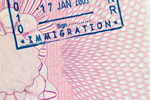A Brief History Of New Zealand
 A Brief History Of New Zealand
A Brief History Of New Zealand
Sadly, the arrival of Westerners introduced muskets to the armoury of the Maori tribes, who traded massive amounts of goods for the weapons. Local wars broke out, slanted towards whichever tribe had the most muskets, but had almost died out by the time the Treaty of Waitangi was signed. The signing of the treaty also stemmed the violence caused by mariners and adventurers which had reached a high level by that point.
As part of the treaty, the Maori peoples were given the same rights as the British citizen immigrants to the country who arrived in droves during the rest of the 19th century, together with a much smaller number of Asians mainly from China. A European system of law and economic statutes was brought in, resulting in most of the islands' land being taken over by immigrants (known as Pakeha), and most Maoris becoming impoverished as a result.
After the official launching of the new colony in 1841, New Zealand regained some degree of self-regulation in 1852 though the Constitution Act, which legalised central and provincial governance. Social benefits introduced from the late 19th century onwards included a pension scheme, women's suffrage and a welfare state as well as regulation of the economy.
By the early years of the 20th century, over a million Pakeha settlers had arrived, causing concern amongst Maoris due to the migrants' purchasing of historic ancestrally-connected communally-held tribal lands. Added to the bitterness felt over the previous confiscation of their lands which sparked the New Zealand Land Wars in the 1860s and 70s, the further land grabs caused general disillusionment amongst the tribes.
New Zealand was badly affected by the Great Depression due to a huge loss of international trade. During WWII, 120,000 troops, including Maoris, were sent to the European theatres of war, with many more Maori relocating to the cities and experiencing racism as a result. Post-war, a Maori protest movement challenged the conservative Kiwi culture.
In the present day, tourism and farming form the heart of New Zealand's economic base, unusual in a developed country. Tragically, in 2011, the country's location on the Pacific Rim of Fire finally hit home, with the massive Christchurch earthquake and continuing aftershock destroying most of the central districts with the loss of several hundred lives.


